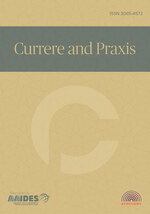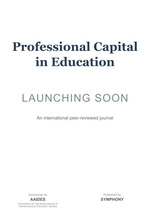The role of online PD in enhancing Ecuadorian teachers’ knowledge of SEL in K-12 classrooms
DOI:
https://doi.org/10.70116/2980274187Keywords:
Social emotional learning, professional development, diverse contexts, multicultural education, international educationAbstract
Social emotional learning (SEL) has gained prominence in Latin America as a crucial component in holistic student development within increasingly pluralistic societies to support students’ academic performance and well-being. This qualitative case study investigated the role of a three-week online professional development (PD) course in enhancing Ecuadorian K-12 teachers’ understanding of SEL concepts and integration in culturally diverse classrooms. Data was collected from participants’ tasks submitted immediately before starting the course (n=52), at the end of week 2 (n=35), and at the end of the course (n=30). Data were analyzed using thematic analysis (Braun & Clarke, 2006). The findings reveal significant improvements in teachers’ understanding of SEL over time as teachers’ SEL definitions expand from a basic focus on emotional regulation to a comprehensive view that incorporates social, cognitive, and behavioral aspects and their positive long-term impact on students’ lives. However, four major challenges identified in their SEL implementation related to student behavior and engagement, teacher preparedness to address learners’ needs, and the role of external socio-cultural factors on SEL implementation. This study highlights the need for PD opportunities to effectively embed SEL within intercultural and diverse educational contexts, offering insights for curriculum development and SEL strategies in multicultural educational settings. The study recommends integrating SEL into PD initiatives tailored for diverse contexts to promote inclusive education This research study offers insights into addressing pluralism, student success, and the creation of positive classroom environments in multicultural contexts.
Downloads
References
Aguilar, E. (2018). Onward: Cultivating emotional resilience in educators. John Wiley & Sons. DOI: https://doi.org/10.1002/9781119441731
Ares, G., Bove, I., Vidal, L., Brunet, G., Fuletti, D., Arroyo, Á., & Blanc, M. V. (2021). The experience of social distancing for families with children and adolescents during the coronavirus (COVID-19) pandemic in Uruguay: Difficulties and opportunities. Children and Youth Services Review, 121, 105906. https://doi.org/10.1016/j.childyouth.2020.105906 DOI: https://doi.org/10.1016/j.childyouth.2020.105906
Bragg, L. A., Walsh, C., & Heyeres, M. (2021). Successful design and delivery of online professional development for teachers: A systematic review of the literature. Computers & Education, 166, 104158. https://doi.org/10.1016/j.compedu.2021.104158 DOI: https://doi.org/10.1016/j.compedu.2021.104158
Braun, V., & Clarke, V. (2006). Using thematic analysis in psychology. Qualitative Research in Psychology, 3(2), 77–101. https://doi.org/10.1191/1478088706qp063oa DOI: https://doi.org/10.1191/1478088706qp063oa
Bryan, A. (2022). From “the conscience of humanity” to the conscious human brain: UNESCO’s embrace of social-emotional learning as a flag of convenience. Compare: A Journal of Comparative and International Education, 54(5), 770–784. https://doi.org/10.1080/03057925.2022.2129956 DOI: https://doi.org/10.1080/03057925.2022.2129956
Burgin, X., Coli, S., & Daniel, M. C. (2021). Exploratory study of Ecuadorian teachers’ understanding of social-emotional learning: An examination of primary school teachers. GIST Education and Learning Research Journal, 22, 125-146. DOI: https://doi.org/10.26817/16925777.964
Caarls, K., Cebotari, V., Karamperidou, D., Alban Conto, M. C., Zapata, J., & Zhou, R. Y. (2021). Lifting barriers to education during and after COVID-19: Improving education outcomes for migrant and refugee children in Latin America and the Caribbean. UNICEF Office of Research – Innocenti.
Casma, J. C. (2015). Emotions are worth as much as knowledge. World Bank Group.
Coli, S., Daniel, M. C., & Burgin, X. D. (2024). The integration of social-emotional learning in English as a foreign language elementary classrooms in Uruguay. International Journal of Emotional Education, 16(2), 57-72. DOI: https://doi.org/10.56300/DIMP5154
Collaborative for Academic, Social, and Emotional Learning (CASEL). (2025). Fundamentals of SEL. https://casel.org/fundamentals-of-sel/
Creswell, J. W., & Guetterman, T. C. (2019). Educational research: Planning, conducting, and evaluating quantitative and qualitative research (6th ed.). Prentice-Hall.
Deniz, Ü., & Yakut-Özek, B. (2023). Online learning experiences of graduate students in Türkiye: Could this be the footsteps of a reform? Participatory Educational Research, 10(1), 213-236. DOI: https://doi.org/10.17275/per.23.12.10.1
Derakhshan, A., & Fathi, J. (2024). Grit and foreign language enjoyment as predictors of EFL learners’ online engagement. The Asia-Pacific Education Researcher, 33(4), 759-769. DOI: https://doi.org/10.1007/s40299-023-00745-x
Durlak, J. A. (Ed.). (2015). Handbook of social and emotional learning: Research and practice. Guilford Publications.
Instituto Nacional de Estadísticas y Censos (INEC). (2022). Resultados principales nacionales. https://www.censoecuador.gob.ec/wp-content/uploads/2023/09/InfoNacionalDatos.pdf
International Work Group for Indigenous Affairs (IWGIA). (2023). Indigenous world 2023: Ecuador. https://www.iwgia.org/en/ecuador/5087-iw-2023-ecuador.html#_edn1
Jokisch, B. D. (2023). Ecuador juggles rising emigration and challenges accommodating Venezuelan arrivals. Migration Policy Institute. https://www.migrationpolicy.org/article/ecuador-migration-trends-emigration-venezuelans
Karakose, T., Polat, H., Yirci, R., Tülübaş, T., Papadakis, S., Ozdemir, T. Y., & Demirkol, M. (2023). Assessment of the relationships between prospective mathematics teachers’ classroom management anxiety, academic self-efficacy beliefs, academic amotivation and attitudes toward the teaching profession using structural equation modelling. Mathematics, 11(2), 449. DOI: https://doi.org/10.3390/math11020449
Kendziora, K., & Yoder, N. (2017). When districts support and integrate social and emotional learning (SEL): Findings from an ongoing evaluation of districtwide implementation of SEL. Education Policy Center at American Institutes for Research.
La Hora. (2023). New subjects? Find out what the new curriculum by competencies of the Ministry of Education means. La Hora. https://www.lahora.com.ec/pais/nuevas-materias-conozca-que-significa-la-nueva-malla-curricular-por-competencias-del-ministerio-de-educacion/
Lumpkin, G. (2023). Implementation of Care for Child Development in Latin America and the Caribbean: Advocacy paper—Making nurturing care a reality for all young children. United Nations Children’s Fund (UNICEF).
Mels, C. (2023). Los docentes como promotores de las habilidades socioemocionales. In I. Achard (Ed.), Mejorar la enseñanza: Fortalecer la formación y el desempeño de los docentes (pp. 61–73). Universidad Católica del Uruguay.
Mezirow, J. (1991). Transformative dimensions of adult learning. Jossey-Bass.
Middleton, K. V. (2020). The longer term impact of COVID 19 on K–12 student learning and assessment. Educational Measurement: Issues and Practice, 39(3), 41-44. DOI: https://doi.org/10.1111/emip.12368
Papadakis, S., Kiv, A. E., Kravtsov, H. M., Osadchyi, V. V., Marienko, M. V., Pinchuk, O. P., Shyshkina, M. P., Sokolyuk, O. M., Мінтій, І. С., Vakaliuk, T. A., Azarova, L. E., Kolgatina, L. S., Amelina, S. M., Volkova, N. P., Velychko, V. Y., Striuk, A. M., & Семеріков, С. О. (2023). Unlocking the power of synergy: The joint force of cloud technologies and augmented reality in education. In Joint Proceedings of the 10th Workshop on Cloud Technologies in Education (CTE 2021) and 5th International Workshop on Augmented Reality in Education (AREdu 2022), Kryvyi Rih, Ukraine, May 23, 2022. CEUR Workshop Proceedings. DOI: https://doi.org/10.31812/123456789/7399
Ramirez, T., Brush, K., Raisch, N., Bailey, R., & Jones, S. M. (2021). Equity in social-emotional learning programs: A content analysis of equitable practices in PreK-5 SEL programs. Frontiers in Education, 6, 679467. https://doi.org/10.3389/feduc.2021.679467 DOI: https://doi.org/10.3389/feduc.2021.679467
Registro Oficial. (2023). Reglamento general a la ley orgánica de educación intercultural: Segundo Suplemento No. 254. Órgano de la República del Ecuador. http://esacc.corteconstitucional.gob.ec/storage/api/v1/10_DWL_FL/eyJjYXJwZXRhIjoicm8iLCJ1dWlkIjoiMmY4ZThkYzEtNTIwMy00NjQzLWE2MGItMDIzZGZlMmE5OTYyLnBkZiJ9
Roffey, S., & McCarthy, F. (2013). Circle Solutions, a philosophy and pedagogy for learning positive relationships: What promotes and inhibits sustainable outcomes? The International Journal of Emotional Intelligence, 5(1).
Schonert-Reichl, K. A. (2017). Social and emotional learning and teachers. The Future of Children, 27(1), 137–155. https://doi.org/10.1353/foc.2017.0007 DOI: https://doi.org/10.1353/foc.2017.0007
Tong, A., Sainsbury, P., & Craig, J. (2007). Consolidated criteria for reporting qualitative research (COREQ): A 32-item checklist for interviews and focus groups. International Journal for Quality in Health Care, 19(6), 349-357. https://doi.org/10.1093/intqhc/mzm042 DOI: https://doi.org/10.1093/intqhc/mzm042
United Nations Children’s Fund (UNICEF). (n.d.). Skills development: Equipping children and adolescents with relevant skills to succeed in life. https://www.unicef.org/skills-development
United Nations Educational, Scientific and Cultural Organization (UNESCO). (2021). Assessment of socioemotional skills among children and teenagers of Latin America: Framework for the ERCE 2019 module work. UNESCO Office Santiago and Regional Bureau for Education in Latin America and the Caribbean. https://unesdoc.unesco.org/ark:/48223/pf0000377512_eng
Wilde, P. K. (2023). Teachers’ perceptions of the impact of online social-emotional learning professional development at a small rural high school (Doctoral dissertation, Lamar University-Beaumont). ProQuest Dissertations Publishing.
Yoder, N., & Gurke, D. (2017). Social and emotional learning coaching toolkit: Keeping SEL at the center. American Institutes for Research.
Downloads
Published
How to Cite
Issue
Section
License
Copyright (c) 2025 Symphony

This work is licensed under a Creative Commons Attribution 4.0 International License.














